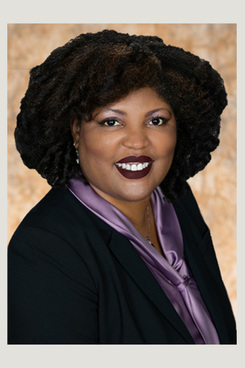How I Made It: 'A Successful DEI Leader Is a Good Listener,' Says Tamika Walters of Burr & Forman
"Have the courage to do things differently and take a path that diverges from the leaders who came before you. You can chart your own course, staying true to your values and your intuition. You may very well become the paradigm that someone else wants to follow."
October 14, 2021 at 04:41 PM
7 minute read
Burr & Forman, Atlanta.
Title: Chief Diversity & Inclusion Officer.
Law School / Graduation Year: Georgetown University Law Center (2004).
 Tamika Walters. (Courtesy photo)
Tamika Walters. (Courtesy photo) Tell us about your career path: My career has taken a different path. I practiced law for five years—first with Choate, Hall & Stewart in Boston (2004-2005), then with Alston & Bird in Atlanta (2005-2009). I spent the next 10 years in senior management roles, including in business development and Diversity, Equity and Inclusion. I was able to deepen my knowledge of the legal industry and hone my leadership skills through roles at Special Counsel (2010-2011), Troutman Pepper (2011-2016) and Kilpatrick Townsend (2016-2020). I was also a pre-law professor at Georgia Tech (2008-2011), which kept fresh the skills I developed as a teacher before beginning my legal career.
What other career activities have shaped your perspective in your current position? I've had the opportunity to follow my passion and gain valuable perspective on promoting more inclusive environments—even outside of the legal profession—with experiences dating back to undergrad and beyond.
While studying educational studies at Brown University, I was the coordinator for the African-, Latino, Asian- and Native-American Mentoring Program and chair of the school's Harambee House, a living center for students interested in the history and culture of the African diaspora.
As a teacher with the Norwood School in Maryland, I had the opportunity to conduct seminars for teachers and administrators through the SEED (Seeking Educational Equity and Diversity) program, and I helped to expand the curriculum to reflect diverse cultural backgrounds.
While attending the Georgetown University Law Center, I interned for the Lawyers' Committee for Civil Rights Under Law, where I worked on school desegregation matters and participated in coordinated efforts of civil rights organizations to write amicus briefs in support of preserving diversity in education in the landmark Supreme Court case Grutter v. Bollinger.
What was the biggest surprise you experienced in leading the firm's key initiatives? I continue to be impressed with the level of buy-in and support from the firm's executive committee and chief executive officer, Ed Christian. As the firm's first CDIO, I did not know to what extent I might face resistance in rolling out new initiatives. The firm's leaders have been willing to try new strategies, put forth innovative ideas, and get directly involved in DEI projects. Having the trust and confidence of the firm's leadership helps me to do my job more effectively, and it helps the firm as a whole to progress.
What's the key to running a successful initiative in your opinion? While it is critical to have buy-in from leadership at the outset, broad-based participation and support drives long-term success. I believe in communicating the vision and purpose of the initiative to people at every level of the firm and providing everyone with opportunities to meaningfully engage. I also believe a successful DEI leader is a good listener who is able to hear concerns and understand perspectives from across the spectrum of job titles and demographics at the firm.
Who had the greatest influence in your career that helped propel you to your leadership role? So many incredible professionals shepherded my career, took chances on me and shaped who I am today. But if I were to hone in on the one who had the greatest influence, I would have to say it was Alison Grounds, managing director and founder of Troutman Pepper eMerge. I helped to manage business development for Alison in the earliest years of eMerge. I watched her grow the business and her phenomenal team from scratch, make the case internally and externally against significant skepticism, and eventually earn the support and admiration of colleagues and clients alike. She led with unwavering vision, respect for her team, a commitment to excellence, and personal authenticity. Her superlative example of leadership is one I try to emulate.
What's the best piece of advice you could give a partner who wants to make it to firm leadership and/or manage key firm initiatives? Self-promotion is necessary, especially for people from backgrounds historically underrepresented in the law. Get comfortable with tooting your own horn and openly celebrating your successes—however unnatural it may feel. If you wait around for people of influence to notice your worth, you may very well miss out on choice opportunities.
What advice would you give to your younger self? (1) Bet on yourself. Say yes to the opportunity. Never sell yourself short if the door opens to do what you truly want to do. (2) Self-care is a part of your job. Nothing gets done well if you are not well yourself. Your physical and mental health should always be at the top of your to-do list, not at the bottom.
What's the best leadership advice you would give to rising female leaders? Have the courage to do things differently and take a path that diverges from the leaders who came before you. You can chart your own course, staying true to your values and your intuition. You may very well become the paradigm that someone else wants to follow.
In your role what programs/activities were you able to accomplish and that you are most proud of? In this first year on the job, my goal is to raise the consciousness of DEI across the firm and enhance the culture of inclusiveness. Achieving that goal is well underway. I have created numerous trainings, programs and educational materials on different cultural identities, unconscious bias, and anti-racism. We now have five affinity groups addressing the needs of women, people of color and LGBTQ+ people. The firm now credits as billable up to 50 hours annually for DEI-related activities.
Of all the accomplishments, I am most proud of launching the firm's Social Justice Initiative. This is the brainchild of Kwende Jones and other partners who were moved to take substantive action during last year's protests. They laid out the scope and purpose before I joined the firm, but I was able to give it structure and get it officially off the ground. To date, we have more than 50 members, including attorneys and staff, all of whom are committed to advancing social justice through education, volunteerism, and pro bono work. I look forward to all we will accomplish together in the coming years.
What is the biggest challenge facing industry leaders today with respect to DEI initiatives? In the DEI area, the challenges are daunting and manifold. We are, in essence, counteracting long-established societal forces. Perhaps the greatest challenge is that the most critical outcomes—hiring, work allocation, promotion, compensation—all come down to individual, often subjective, decisions. We can monitor the outcomes of these decisions, but it is impossible to be in everyone's head or in every room where the decisions are being made. For this reason, training and education are at the core of DEI initiatives. We must attempt to shape hundreds of minds into making these decisions fairly, equitably and without bias. In some cases, this requires deprogramming the way a person has been thinking for decades. The task is supremely difficult, but I refuse to believe it is impossible. People can and will evolve under the right leadership.
NOT FOR REPRINT
© 2025 ALM Global, LLC, All Rights Reserved. Request academic re-use from www.copyright.com. All other uses, submit a request to [email protected]. For more information visit Asset & Logo Licensing.
You Might Like
View All
Movie Theater Agrees to Pay Former Employee $137K in EEOC Discrimination Settlement
3 minute read
Atlanta Law Firm Joins Mansfield Effort for More Leadership Diversity
5 minute read

Atlanta-Based Fearless Fund Ends Black-Only Entrepreneurial Grant Contest After Settling Civil Rights Lawsuit
Law Firms Mentioned
Trending Stories
- 1NY AG James Targets Crypto Fraud Which Allegedly Ensnared Victims With Fake Jobs
- 2The 'Motherhood Advantage' in Law: Time to Flip the Script
- 3Fenwick & West Shutters Decade-Old Shanghai Office
- 4Thompson Coe, 2 Lawyers, Hit by $1M+ Legal Mal Suit
- 5Regulatory Intelligence Platform Abstract Announces $4.8 Million in Seed Funding
Who Got The Work
Michael G. Bongiorno, Andrew Scott Dulberg and Elizabeth E. Driscoll from Wilmer Cutler Pickering Hale and Dorr have stepped in to represent Symbotic Inc., an A.I.-enabled technology platform that focuses on increasing supply chain efficiency, and other defendants in a pending shareholder derivative lawsuit. The case, filed Oct. 2 in Massachusetts District Court by the Brown Law Firm on behalf of Stephen Austen, accuses certain officers and directors of misleading investors in regard to Symbotic's potential for margin growth by failing to disclose that the company was not equipped to timely deploy its systems or manage expenses through project delays. The case, assigned to U.S. District Judge Nathaniel M. Gorton, is 1:24-cv-12522, Austen v. Cohen et al.
Who Got The Work
Edmund Polubinski and Marie Killmond of Davis Polk & Wardwell have entered appearances for data platform software development company MongoDB and other defendants in a pending shareholder derivative lawsuit. The action, filed Oct. 7 in New York Southern District Court by the Brown Law Firm, accuses the company's directors and/or officers of falsely expressing confidence in the company’s restructuring of its sales incentive plan and downplaying the severity of decreases in its upfront commitments. The case is 1:24-cv-07594, Roy v. Ittycheria et al.
Who Got The Work
Amy O. Bruchs and Kurt F. Ellison of Michael Best & Friedrich have entered appearances for Epic Systems Corp. in a pending employment discrimination lawsuit. The suit was filed Sept. 7 in Wisconsin Western District Court by Levine Eisberner LLC and Siri & Glimstad on behalf of a project manager who claims that he was wrongfully terminated after applying for a religious exemption to the defendant's COVID-19 vaccine mandate. The case, assigned to U.S. Magistrate Judge Anita Marie Boor, is 3:24-cv-00630, Secker, Nathan v. Epic Systems Corporation.
Who Got The Work
David X. Sullivan, Thomas J. Finn and Gregory A. Hall from McCarter & English have entered appearances for Sunrun Installation Services in a pending civil rights lawsuit. The complaint was filed Sept. 4 in Connecticut District Court by attorney Robert M. Berke on behalf of former employee George Edward Steins, who was arrested and charged with employing an unregistered home improvement salesperson. The complaint alleges that had Sunrun informed the Connecticut Department of Consumer Protection that the plaintiff's employment had ended in 2017 and that he no longer held Sunrun's home improvement contractor license, he would not have been hit with charges, which were dismissed in May 2024. The case, assigned to U.S. District Judge Jeffrey A. Meyer, is 3:24-cv-01423, Steins v. Sunrun, Inc. et al.
Who Got The Work
Greenberg Traurig shareholder Joshua L. Raskin has entered an appearance for boohoo.com UK Ltd. in a pending patent infringement lawsuit. The suit, filed Sept. 3 in Texas Eastern District Court by Rozier Hardt McDonough on behalf of Alto Dynamics, asserts five patents related to an online shopping platform. The case, assigned to U.S. District Judge Rodney Gilstrap, is 2:24-cv-00719, Alto Dynamics, LLC v. boohoo.com UK Limited.
Featured Firms
Law Offices of Gary Martin Hays & Associates, P.C.
(470) 294-1674
Law Offices of Mark E. Salomone
(857) 444-6468
Smith & Hassler
(713) 739-1250







